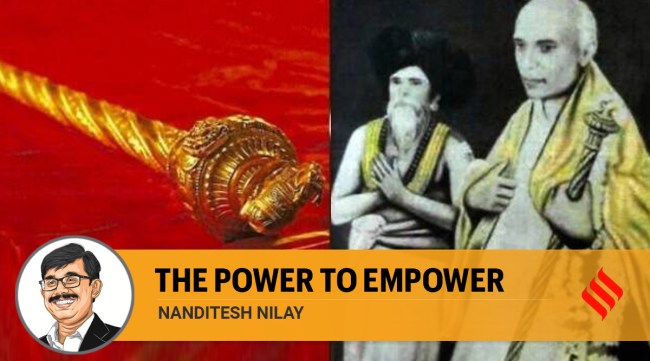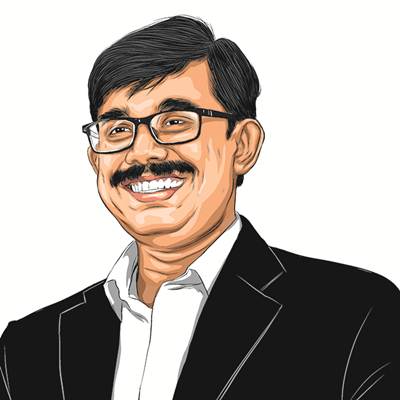Opinion In good faith: The true spirit of the Sengol
This traditional symbol of power, placed in the Lok Sabha, is emblematic of the pledge to listen to all, to embody the spirit and soul of our civilisation, to use the power of caring, responsibility and service
 In its literal definition, power is the ability to control and influence others for a cause.
In its literal definition, power is the ability to control and influence others for a cause. G-20, Russia vs Ukraine, old vs new Parliament, Sengol, a six-time MP vs wrestlers, satta vs vipkash — the current discourse is all about Power, with a capital P. In times as polarised as ours, is power always a force that vitiates, seeks to control, or is it one that can strengthen, and help us rise to our better nature? In other words, can power — something we all need and wish for — and the pursuit of power, become a virtue?
In its literal definition, power is the ability to control and influence others for a cause. Power is all-pervasive, it permeates every sense of our being, it comes in many forms: Money power, muscle power, profile power, chair power, academic power, bureaucratic power, networking power, market power, purchasing power, ego power and tech power. In physics, power is the rate of doing work. In metaphysics, it’s about a human’s control over her thoughts and feelings. Post-Covid, power, for many of us, has got reshaped in terms of vulnerability. In all this noise over power, we miss five of its aspects that lie at the heart of who we are as Indians.
Spiritual power: For Socrates, power comes with the control and order of one’s body and soul — the discipline to act justly, live virtuously. The citizen should be more powerful than the consumer. For Vivekananda, the spirit of unification of soul and body or Advait makes a person powerful. For Mahatma Gandhi, we cannot understand the meaning of power until we are aware of the enlightened self. That can only be done by reduction of self-centeredness — the power of a genuine sense of humility, that comes from becoming aware of the power of the inner self.
The power of family: Becoming a parent or a member of a family is an act of interconnectedness, of our selves being linked to others. The source of power in a family is affection and gratitude, respect and caring. Parents derive power not just from addressing the material needs of children but by playing the guardian – one who provides moral and emotional, physical and material support. A powerful family is one where the child sees the parent as a benchmark of goodness, where she doesn’t need to look elsewhere for the light and to understand what the right thing is. Japan’s Prime Minister Fumio Kishida sacked his eldest son as aide amid public outcry over the latter’s use of the leader’s official residence for a private party. Former New Zealand Prime Minister Jacinda Ardern left the chair for her family responsibilities. By one’s conduct at the family level, both imbued power with a sense of ethics and being good.
The power of caring: Assumptions of authority and imperatives of governance seriously detract from the spirit of power. Power should define a relationship not by asking the question, “Who are you?”, but by asking, “How are you?”. When the person in power relates to others through this question, only then can he be a true leader. How those in authority relate to those who are powerless defines power and its limits. In a democracy, that means listening to and addressing the needs and aspirations of all — those on the margins and also those who may not have voted to bring you to power. This is the power of caring, it transcends party lines and term limits. It is the power that endures.
The power of responsibility: In political philosophy, the moral responsibility of action is about being aware of four things: The act in itself, the moral significance of the action, the consequences of that action and the alternatives available. Understanding all four is the power of responsibility. Nothing illustrates this better than the opening line of the 1983 Chicago address by Swami Vivekananda: “Sisters and Brothers of America”. That redefined the power of communication as reaching out across differences with no space for hatred or insult. Power isn’t just about speaking, listening is about power too. The Vedas, the basic structure of our philosophy and civilisational ideas, are shruti kavya or the outcome of listening. Leaders who listen are the ones whose power empowers. Otherwise, their power is based on fear and threat.
The power of service: A caring society is a courageous society and a courageous society believes in the power of service. Motherhood, fatherhood, a teacher caring for her students, frontline workers during Covid — these embody the power of service. Civil service in a democracy is based on nishkama karma. Those who fanned out across the country with cases full of vaccines upheld nishkama karma. This is what makes the unknown powerless.
When Alexander found himself ignored by a group of Jain monks, he asked them why they were ignoring the most powerful person on earth. “King Alexander,” they replied, “every man can possess only so much of the earth’s surface as this we are standing on. You are but human like the rest of us, save that you are always busy and up to no good, travelling so many miles from your home, and a nuisance to yourself and to others! You will soon be dead and then you will own just as much of the earth as will suffice to bury you.” This exchange is perhaps a myth but it also shows us that the freedom to call out a king is as powerful as the freedom the king gives to the commoner.
That should be the true spirit of the Sengol. This traditional symbol of power, placed in the Lok Sabha, is India affirming that sovereignty and power reside in Parliament which draws its power from the Constitution, the living, breathing document that we, the people of India, have pledged to — to listen to all, to embody the spirit and soul of our civilisation, to use the power of caring, responsibility and service. Because, in the end, the power of a leader is tested by the capacity and capability to empower those they lead, both the powerful and the powerless, no more and no less.
The writer is the author of the books, Being Good, Aaiye, Insaan Banaen and Ethikos: Stories searching happiness. He teaches and trains courses on ethics, values and behaviour






